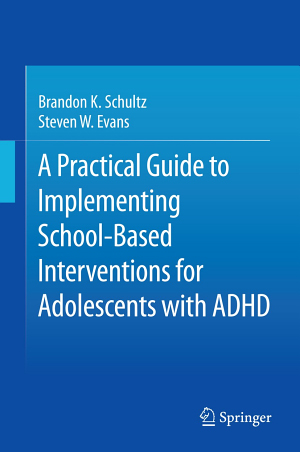Dr. Steven W. Evans, Professor of Psychology at Ohio University, co-authored A Practical Guide to Implementing School-Based Interventions for Adolescents with ADHD (Springer 2015).
The book bridges the gap between research and practice regarding adolescents with behavior problems. Evans is also Editor-in-Chief of the journal School Mental Health.
His co-author is Dr. Brandon K. Schultz, Assistant Professor of Psychology at East Carolina University.
 This innovative volume details counseling interventions for secondary students with ADHD and its associated academic and conduct problems, particularly focusing on youth at risk for developing serious disruptive behaviors. It addresses the continuing debate over counseling for youths with ADHD by identifying key elements common to reputable therapies and suggesting a framework for their successful implementation. The core of the book discusses the Challenging Horizons Program (CHP), a behavior- and solutions-focused approach to counseling adolescents with ADHD that has been studied extensively for more than 15 years. Based on the quality of research, the CHP has been included in the National Registry of Evidence-based Programs and Practices maintained by the U.S. Substance Abuse and Mental Health Services Administration (SAMHSA). Excerpts from actual sessions illustrate typical therapist-client interactions in the CHP, and sample modules from the program’s treatment literature expand the book’s descriptions of effective hands-on interventions.
This innovative volume details counseling interventions for secondary students with ADHD and its associated academic and conduct problems, particularly focusing on youth at risk for developing serious disruptive behaviors. It addresses the continuing debate over counseling for youths with ADHD by identifying key elements common to reputable therapies and suggesting a framework for their successful implementation. The core of the book discusses the Challenging Horizons Program (CHP), a behavior- and solutions-focused approach to counseling adolescents with ADHD that has been studied extensively for more than 15 years. Based on the quality of research, the CHP has been included in the National Registry of Evidence-based Programs and Practices maintained by the U.S. Substance Abuse and Mental Health Services Administration (SAMHSA). Excerpts from actual sessions illustrate typical therapist-client interactions in the CHP, and sample modules from the program’s treatment literature expand the book’s descriptions of effective hands-on interventions.
Counseling skills featured in this book include:
- Bridging the research-into-practice divide.
- Establishing a therapeutic alliance with students with ADHD.
- Developing and implementing interventions for memory, organization, and planning.
- Enhancing young clients’ social skills.
- Enlisting family members in the intervention process.
- Working directly with teachers to improve student behaviors.
A Practical Guide to Implementing School-Based Interventions for Adolescents with ADHD is an essential resource for researchers, clinicians and related professionals, and graduate students in such disciplines as school and clinical child psychology, social work, educational psychology, psychotherapy and counseling, and learning and instruction.


















Comments